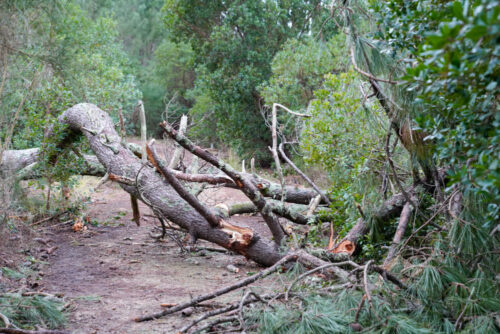
The cooler temperatures and the changing colors of the leaves make autumn an especially beautiful time of the year in New England. However, while you were out enjoying the sights, sounds and weather of fall, a tree fell and injured you such that you believe it warrants financial compensation. But who can you hold liable for a fallen tree in Connecticut? As it turns out, the answer to that question is rather complicated, depending on who owns the tree and how and where the accident occurred. For more information, please keep reading, then contact an experienced Stamford, Connecticut slip and fall lawyer.
Who is responsible for a fallen tree in Connecticut?
In general, courts have found property owners are not liable if an otherwise healthy tree falls due to an “act of God,” i.e. a natural event. Conversely, courts have found that if the landowner knew or should have known that the tree’s condition, i.e. rot, posed an unreasonable danger and failed to eliminate the danger, the owner may be liable under certain circumstances.
More often than not, these cases hinge on common law, i.e. whether the plaintiff could prove the claim under the legal theories of negligence or nuisance. Whether a court would find a landowner liable depends on various factors and requires a fact-specific inquiry in any given case.
Can you hold a private property owner liable for a fallen tree in Connecticut?
Yes, you can hold a private landowner liable for injuries caused by a tree or branch striking a pedestrian or a car passing on a public road. If you can prove that the landowner was aware of the dangerous condition and did not remedy it, you may receive compensation. However, if the tree was within the exclusive authority of a tree warden, the landowner may avoid liability. Such proof may depend upon the opinions of an arborist who can evaluate the remains of the fallen tree either in person or through photographs.
What is municipal liability in Connecticut?
With limited exceptions, the law gives municipal tree wardens authority over trees on private property if the trees’ roots or branches extend onto or over any public roads or grounds. For instance, a plaintiff might argue that a municipality is liable because:
- The tree warden breached his or her duty to inspect a potentially hazardous tree after being warned of the tree’s conditions, and
- The failure to do so caused the plaintiff’s injuries
Is the state ever liable for a fallen tree?
In certain circumstances, plaintiffs may hold the State of Connecticut liable for injuries from fallen trees. These cases tend to be more complicated, but often they involve trees along highways or other roads under the jurisdiction of the State of Connecticut Department of Transportation. Such a claim may depend upon serving a notice of claim on state authorities within 90 days of the injurious event.
You can expect the above-listed parties to point fingers at one another. A skilled Fairfield County, Connecticut personal injury lawyer will help you determine the negligent party and fight to have them held accountable in a court of law.
Contact our experienced Connecticut Firm
Contact Casper & de Toledo today to schedule your free initial consultation with our seasoned traumatic brain injury lawyers.

